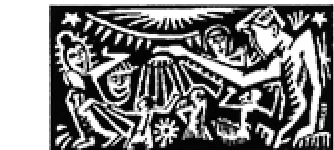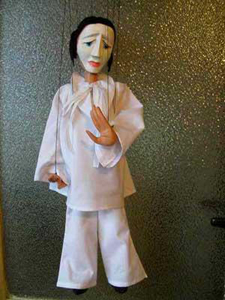

“On the Marionette Theatre” by Heinrich von Kleist (1777-1811)
It is not easy to classify Kleist’s “On the Marionette Theatre”. At first glance is seems like a narrative, but it quickly turns into a kind of speculative essay, with philosophical or even theological overtones. It is mysterious, perplexing and thought-provoking. Since it is easily available in a fluent translation by Idris Parry at: http://www.southerncrossreview.org/9/kleist.htm , I hope that these remarks will encourage others to read and ponder it – and to share their thoughts.
It takes the form of a conversation between the narrator and a friend who is principal dancer at the local theatre. Having noticed that his friend has often attended performances of marionettes in the town square, the narrator asks him why he is so interested in such vulgar and mechanical performances. The dancer replies that for him these puppets move with more grace and freedom than their human counterparts.

The turning point of the piece is when the dancer gives his explanation for this superiority. The main reason, he argues, is that unlike a human, a puppet can never be guilty of affectation:
“For affectation is seen, as you know, when the soul, or the moving force, appears at some point other than the centre of gravity of the movement.”
In other words, there is a loss of unity. Observing that there is often a disparity between the body of human dancers and the soul of the movement they are making, he relates this phenomenon to the third chapter of Genesis – the account of the fall of man.
“Misconceptions like this are unavoidable”, he said, “now that we’ve eaten of the tree of knowledge. But paradise is locked and bolted, and the cherubim stands behind us. We have to go on and make the journey round the world to see if it is perhaps open somewhere at the back.”
Later he says that, “where grace is concerned, it is impossible for man to come anywhere near a puppet. Only a god can equal inanimate matter in this respect. This is where the two ends of the circular world meet.” Then the narrator himself relates how he actually witnessed a young friend lose his innocence through becoming self-conscious, thereby losing the ability to act naturally. After describing his own encounter with a bear which he was unable to strike with a rapier, the dancer concludes: `
“We see that in the organic world, as thought grows dimmer and weaker, grace emerges more brilliantly and decisively…Grace appears most purely in that human form which either has no consciousness, or an infinite consciousness. That is in the puppet or in the god.”
“Does that mean,” I said in some bewilderment, “that we must eat again of the tree of knowledge in order to return to the state of innocence?”
“Of course,” he said, “but that’s the final chapter in the history of the world.”
I don’t intend to offer an “explanation” of these observations : part of the attraction this piece has for me, and why I often reread it, is that it invites, and stimulates me to ponder on such questions as the nature of my role and responsibility in life, given that I am (like everybody) “in between” – neither puppet nor god. At times I can see, more or less clearly, my incompleteness, a vision which can be the very stimulus to live more wholly. Then the piece talks of “knowledge” – but what exactly is meant by that? Not just an inert accumulation of facts surely – but knowledge of a higher order.
Finally, what is meant by the phrase, “as thought grows dimmer and weaker, grace emerges more brilliantly and decisively”? Is it possible to relate this to my own direct experience – and if so what are the conditions that foster such a unity, however fragile and fluctuating?
The brief, intelligent commentary which follows the translation makes the point that, “it is only our concept of time which makes us think of the Fall of Man as a historical event in the distant past. It is happening all the time.” Personally I find myself thinking of Blake, and his notion of “organised innocence”. However tempting it may be to do so, there is no “going back” to a state of primal innocence and unity. Blake’s “Prophetic Books” are a vivid – if at times daunting – testimony to the striving towards that higher state, and of the forces which resist or mislead such efforts. Be that as it may, in my experience, in just six short pages (including the commentary) “On the Marionette Theatre” provides plenty of material to call those already touched by the expression “in between” to reflect actively on the nature and condition of man.
Julian Arloff